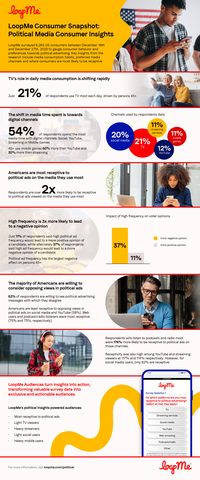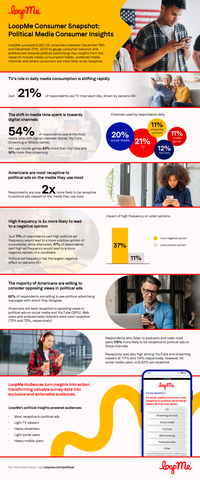LONDON & NEW YORK--(BUSINESS WIRE)--LoopMe, a leading technology company that uses artificial intelligence (AI) to improve brand advertising outcomes, today announced the results of a new survey exploring U.S. voter sentiment towards political advertising in the context of ad placement and frequency. A key finding revealed American voters are more than twice as likely to be receptive to political advertising on the media they use most when compared with other channels. The survey polled 6,262 U.S. consumers on their mobile devices via LoopMe’s proprietary AI-led polling technology, PurchaseLoop™ Audiences.
“In this important election year, understanding the shifting patterns of media consumption is critical in order to properly allocate political advertising budgets for efficient reach across all demographics,” said Robin Porter, Head of Political at LoopMe. “Our new data shows that campaign effectiveness can be improved significantly by engaging with voters on the channels they use most. Audiences that spend more time in digital environments shared that they are most receptive to political ads in digital platforms such as streaming and social media. The study also revealed that older respondents are more likely to supplement TV viewership with mobile gaming with receptivity in both.”
LoopMe’s survey findings include:
- The majority of Americans are willing to consider opposing views in political ads: Overall, 62% of respondents said they are open to seeing political advertising messages with which they disagree. When drilling down by medium, social media and YouTube users were least receptive (59%) while web surfers and podcast/radio listeners were most receptive (75% and 73%, respectively).
- The top five media channels that respondents said they use the most each day were: TV (21%), social media (20%), YouTube (12%), streaming services (11%), and mobile games (11%).
- While a two-fold boost in receptivity can be expected for political ads shown on the voter’s preferred media, this boost under-performs on social media. Respondents who said they listen to podcasts and radio most were 176% more likely to be receptive to political ads on those channels; for YouTube and streaming, the receptivity boost was 117% and 114%, respectively; however, for social media, the receptivity figure drops down to 82%.
- Repetitive political advertising can create negative voter sentiment: 37% of respondents indicated distaste for viewing the same political ad too many times. In fact, LoopMe’s data showed that high frequency was upwards of 3x as likely to result in a more negative opinion of a message, especially for older voters.
“Allocating spend to digital channels to diversify political advertising can both reach incremental audiences beyond traditional TV and manage frequency amongst an audience most opposed to seeing a high number of ads,” added Porter.
LoopMe CTV measurement client, Origin, also recently conducted a nationwide study via LoopMe’s surveying technology with a focus on voter sentiment specific to TV advertising. The Origin survey reinforces that repetitiveness in political advertising has also been noticed by TV viewers: 30% of the 7,237 U.S. streaming households surveyed in Origin’s study said that they see the same political ad too often. Origin’s data also showed that nearly 65% of these U.S. streaming households are currently undecided on how they will vote in the 2024 elections, and when asked whether a political ad they see on TV could make them reconsider how they vote, almost a third indicated it would ‘if it’s relevant to where I live’.
“All the data here points to one takeaway for political advertisers: don't wait until after the election to find out you didn’t have the attention of the undecided voters you needed,” said Fred Godfrey, Origin’s CEO and co-founder.
To view the research, please visit: https://loopme.com/insights/loopme-consumer-snapshot-political-media-consumer-insights.
About LoopMe
LoopMe is a technology company that uses artificial intelligence (AI) to improve brand advertising performance and outcomes. LoopMe was the first to apply AI to brand advertising and its Intelligent Marketplace, finding solutions to industry challenges that haven’t previously been solved. With consumer insights and AI at its core, LoopMe makes brand advertising better, outperforming industry benchmarks for leading global brands. Our vision is to change advertising for the better, by building technology that will redefine brand advertising. LoopMe was founded in 2012 and is headquartered in the UK, with global offices across New York, Boston, Atlanta, Chicago, Detroit, San Francisco, Los Angeles, Toronto, Singapore, Sydney, Tokyo, Dnipro, Krakow and Hong Kong. For more information, please visit www.loopme.com.




